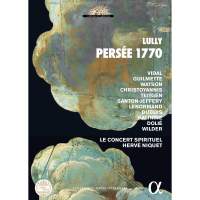Texte paru dans: / Appeared in: |
|
|
Outil de traduction (Très approximatif) |
|
|
Reviewer:
David Vickers
This fascinating intersection of Lulliste reception and cultural and political history comes alive in Hervé Niquet’s vibrant recording made in the Royal Opera at Versailles. Katherine Watson’s jealous Mèrope, Tassis Christoyannis’s villainous Phinée, Marie Kalinine’s bitter Méduse, Hélène Guilmette’s anguished Andromède and Mathias Vidal’s full-blooded Persée all sing with spirited commitment, although the contributions of most characters are marginalised by the radical 1770 abridgements that evidently favoured spectacular divertissements over the more measured detail and graceful pacing of Lully’s original drama. The assembled forces fall some way short of the 1770 production’s tally of 95 chorus singers and 80 orchestral players but Le Concert Spirituel’s playing and singing are as ripe as anyone accustomed to Niquet’s lively musicianship will expect. Dauvergne’s reinforced orchestration in the divertissement of Ethiopians competing in archery, wrestling and dancing is played with vigorous boldness, whereas a sleepy divertissement in the Gorgons’ den features Rebel junior’s woodwind-enriched instrumentation. Dauvergne’s new music for the final act’s deus ex machina for Venus (sung alluringly by Chantal Santon-Jeffrey) and a florid aria for Persée constitute a ‘modern’ licenza paying homage to the Dauphin and Marie Antoniette that is a world apart from Lully’s conclusion. Alpha’s lavishly illustrated hardback book contains everything one could wish for except a transparent concordance of the departures from Lully’s original score in each scene of this peculiar version – anyone uninitiated into Persée might want to listen to the exemplary recording by Les Talens Lyriques and Christophe Rousset or watch the film of Niquet’s own performance with Opera Atelier and Tafelmusik in order to digest intriguing evidence of how the tragédie en musique was reinvented a few generations later by musicians shaking off the composer’s monopolistic spectre. |
|




